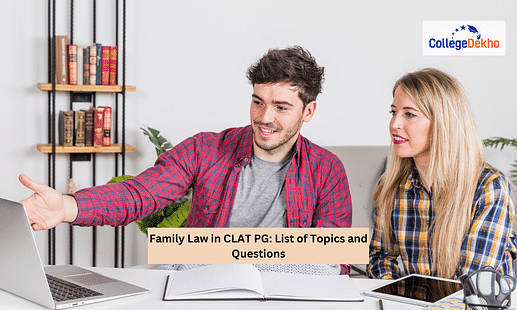
Family Law in CLAT PG is the subject area dealing with various family relationships, as well as the resultant legal consequences. Studying family law will help you better understand it for the exam, and in future legal practice.
Family Law essential topics such as marriage, divorce, maintenance and adoption must be covered by you to ace this topic in the exam. There are certain special legal frameworks under the Hindu and Muslim law under family law subject which you should cover thoroughly. The Hindu Marriage Act of 1955 provides legal aspects of marriage and Muslim Personal Law deals with marriage in Islamic contexts.
There will be multiple choice questions to check your understanding of these topics. The question paper consists of 120 questions, each of one mark. The penalty for an incorrect answer is 0.25 marks. So, if you master Family Law, it can help your overall score a lot.
Get acquainted with noted judgments of Family law in India. Cases like Vishaka vs State of Rajasthan are of paramount importance in understanding the legal precedents. You also should review more recent reforms and discussions of the uniform civil code, gender justice, and so forth.
Study in depth statutes and important judgments concerning Family Law. By doing this preparation you won’t only benefit in the exam but also create a strong base to start your legal career.
Also Read:
Criminal Law in CLAT PG 2025
List of Important Topics of Family Law for CLAT PG 2025
Family law is one of the core components of knowledge for the CLAT PG 2025 examination which will include several topics and concepts that are essential for the formation of an adequate notion of the legal regulation of familial relations. Here are some of the important topics of family law which are relevant for your CLAT PG 2025 preparation:
1. Marriage
- Concept of Marriage: Getting acquainted with the meaning of the term, the classification of marriages: monogamous and polygamous, the role of marriages within the framework of family law.
- Hindu Marriage Act of 1955: Role of bride & groom in marriage, rites and rituals of a Hindu wedding and process to make a marriage a legal one.
- Muslim Personal Law: Some initial ideas about Marriage in the Islamic Sharia, Nikah and the conditions required for a valid marriage.
2. Divorce
- Grounds for Divorce: Under various personal laws, the following are the grounds for divorce: cruelty, adultery, desertion, and mutual consent.
- Judicial Separation: This paper aims to provide general information on the idea and legal approaches of the concept of judicial separation prior to filing for a divorce.
- Divorce under Hindu Law: Few and specific amendments relating to provisions under the Hindus Marriage Act governing Indian divorce laws.
3. Maintenance and Alimony
- Right to Maintenance: Interim and permanent maintenance which are legal rights and duties of spouses united in matrimony.
- Factors Influencing Maintenance: They are the financial situation of both parties, length of marriage, and the established standard of living.
- Maintenance under Different Laws: Section 8: Differences in the maintenance laws for Hindus, Muslims, and Christians.
4. Adoption
- Legal Framework for Adoption: Analysing the provisions of the Adoption and Maintenance of Children Act, 1956 and its significance.
- Types of Adoption: Hindu adoption laws and the laws applicable to other communities.
- Process of Adoption: A list of the legal formalities that a couple must complete in order to adopt a child in terms of consent and referral to the court.
5. Guardianship and Custody
- Types of Guardianship: Rights and duties of guardians under various personal laws.
- Custody of Children: Factors that the court considers when making custody decisions, for example, the best interest of the child, different categories of custody such as sole and joint custody.
- Custody Disputes: The possibilities of seeking legal means for the resolution of the custody conflict, such as mediation and judicial involvement.
6. Succession and Inheritance
- Intestate Succession: Chapters of law which deal with the distribution of property among heirs in the event of the death of the owner or the testator in the absence of a will.
- Testamentary Succession: Knowledge of and about wills, codicils, and the requirements for the proper preparation of a valid will.
- Personal Laws and Succession: Differences in the legal systems regarding the matter of succession such as the Hindu Succession Act, Muslim Personal Law, Christian Laws, etc.
7. Joint Family System
- Concept of Joint Family: Learning the various aspects of a joint family under Hindu law; its rights and its responsibilities.
- Partition of Joint Family Property: Division of property between various members of a family and the legal position of co-sharers.
8. Landmark Judgments
- Significant Case Laws: Knowledge of leading cases that have defined family law in India including the Vishaka v. State of Rajasthan and Shayara Bano v. Union of India.
- Impact of Judicial Decisions: Comprehending the dynamics of how court decisions determine the meaning and enforcement of family laws.
9. Recent Developments
- Amendments and Reforms: Being aware of the contemporary issues in the legislation, the discussions on the uniform civil code, gender justice, etc.
10. Legal Principles and Procedures
- Family Court System: Brief history of the family courts, their jurisdiction and the manner in which they deal with family matters.
- Alternative Dispute Resolution: Mediation and arbitration as processes for dealing with family law problems.
Also Read: Important Topics for CLAT 2025 GK and Current Affairs
List of Important Questions of Family Law for CLAT PG 2025
Here are some of the important family law MCQ based questions along with their answers; knowing them will help you in your overall CLAT PG preparation:1. The institution of marriage primarily arises from:
(a) man's quest to know the maternity of children
(b) man's quest to know the paternity of children
(c) both (a) & (b)
(d) either (a) or (b)
Answer: (b)
2. The Hindu Code was drafted by:
(a) Rau Committee and was referred to Select Committee of the Constituent Assembly in 1948
(b) Rau Committee was not referred to Select Committee of Constituent Assembly
(c) Hindu Code was not drafted by Rau Committee
(d) none of the above
Answer: (a)
3. Under Hindu law, marriage is considered:
(a) sacrament
(b) contract
(c) both (a) & (b)
(d) neither (a) nor (b)
Answer: (a)
4. Which act governs marriages among Hindus?
(a) Hindu Marriage Act, 1955
(b) Special Marriage Act, 1954
(c) Child Marriage Restraint Act, 1929
(d) all the above
Answer: (a)
5. Which of the following is not a valid ground for divorce under Hindu law?
(a) Adultery
(b) Cruelty
(c) Conversion to another religion
(d) Financial instability
Answer: (d)
6. Who can adopt under the Hindu Adoptions and Maintenance Act, 1956?
(a) Any Hindu adult
(b) Only married couples
(c) Any Hindu male or female
(d) Only Hindu males
Answer: (c)
7. What is the age requirement for a valid marriage under Hindu law for males?
(a) 18 years
(b) 21 years
(c) 16 years
(d) 25 years
Answer: (b)
8. Under the Hindu Succession Act, 1956, who is not considered a Class I heir?
(a) Mother
(b) Daughter
(c) Son’s daughter
(d) Brother
Answer: (d)
9. Which section of the Hindu Marriage Act, 1955 deals with judicial separation?
(a) Section 10
(b) Section 13
(c) Section 9
(d) Section 14
Answer: (a)
10. Which of the following is a recognized form of guardianship under Hindu law?
(a) Testamentary guardianship
(b) Guardianship by affinity
(c) Guardianship by choice
(d) Community guardianship
Answer: (a)
11. Which act deals with the partition of Hindu joint family property?
(a) The Hindu Marriage Act, 1955
(b) The Hindu Succession Act, 1956
(c) The Hindu Minority and Guardianship Act, 1956
(d) The Hindu Adoptions and Maintenance Act, 1956
Answer: (b)
12. Under Hindu law, a marriage is voidable if:
(a) One party was already married
(b) One party was underage at the time of marriage
(c) The marriage was not consummated
(d) The marriage was performed without proper ceremonies
Answer: (a)
13. Which section of the Hindu Marriage Act, 1955 provides for divorce by mutual consent?
(a) Section 13B
(b) Section 13A
(c) Section 11
(d) Section 9
Answer: (a)
14. The concept of Irretrievable Breakdown of Marriage is given under which section of the Hindu Marriage Act, 1955?
(a) Judgement made law
(b) Section 13
(c) Section 12
(d) Both (a) and (c)
Answer: (b)
15. Which of the following is not a type of Hindu Undivided Family (HUF) property?
(a) Ancestral property
(b) Self-acquired property
(c) Coparcenary property
(d) Partitioned property
Answer: (d)
16. Under Hindu law, who is the natural guardian of a minor child?
(a) The mother
(b) The father
(c) Both mother and father
(d) The eldest sibling
Answer: (b)
17. Which of the following marriages are not recognised under the Hindu Marriage Act, 1955?
(a) Valid Marriage
(b) Void Marriage
(c) Voidable Marriage
(d) None of the above
Answer: (b)
18. Who has the first right to inherit the property of a Hindu male dying intestate?
(a) The mother
(b) The wife
(c) The daughter
(d) The son
Answer: (d)
19. Which of the following is not a ground for divorce under Hindu law?
(a) Bigamy
(b) Adultery
(c) Cruelty
(d) None of these
Answer: (d)
20. As per the Hindu Marriage Act, 1955, neither party should have a spouse living at the time of the marriage. This is referred to as:
(a) Bigamy
(b) Void marriage
(c) Voidable marriage
(d) None of the above
Answer: (a)
Best Books to Prepare Family Law in CLAT PG 2025
Here are some of the good books and materials that you must use to prepare for Family Law in CLAT PG 2025:
Book Title | Author | Description |
|---|---|---|
Family Law | Poonam Pradhan | A rich source of information on all issues concerning family such as marriage, divorce, and custody. |
Family Law: Theory and Practice | R.K. Bangia | Analysis of Family Law principles and explanation of the same using real life examples and case scenarios. |
Hindu Law | Dr. J.D. Jain | It is a collection of laws that deals with Hindus more particularly in matters concerning marriage, adoption, and inheritance. |
Muslim Law | M. A. Qureshi | Specifically, the focus will be on marriage, divorce and maintenance provisions as enshrined in Muslim family law. |
The Law of Marriage and Divorce | Ratanlal & Dhirajlal | Provides information related to marriage and divorce laws under various religious practices in India. |
Family Law in India | Dr. Ashok Jain | Discusses Indian family laws, significant cases and recent trends in this legal field. |
Law of Adoption | S. K. Gupta | Centred around legislative aspects of adoption in India such as laws and processes. |
Principles of Family Law | R.K. Bangia | Aims at discussing the basic principles of family law with the necessary case laws and judicial proceedings. |
Case Law on Family Law | A. R. Sharma | Documentation of a large number of important case laws relating to family law in India. |
Maintenance Laws in India | Poonam Pradhan | Discussions on various maintenance laws with regard to the obligations as well as the rights of individuals under this statute. |
Child Custody Laws | Dr. N. V. Paranjape | An overview of child custody laws and rules, citing legal theories as well as case examples. |
Comparative Family Law | S. P. Singh | A comparative study of family laws of different countries and observations of similarities or dissimilarities. |
Family Law: Recent Developments | Various Authors | A set of articles and papers on family law highlighting recent developments and trends. |
Family and Property Law | Poonam Pradhan | The book includes rights based on family law and rights of an individual in relation to property or inheritance laws. |
Law of Marriage and Divorce in India | R.K. Bangia | Analysis of legal provisions on marriage and divorce, the processes involved in both Laws in India. |
Family Law Handbook | S. K. Gupta | A handy guide that would help the readers comprehend the notion and workings of family laws effectively. |
Landmark Judgments in Family Law | Various Authors | Overview of key decisions that have contributed as the legal foundation for family law reform in India. |
Family Law: A Comprehensive Guide | Dr. Ashok Jain | An all-encompassing guide which provides information about historical background and reforms in family law. |
The Indian Family Law System | Ratanlal & Dhirajlal | Explains the organization and operation of the family law system in the context of the legal framework of India. |
Essentials of Family Law | M. A. Qureshi | A brief reference on family law terminology and guidelines for the basic notions and principles. |
Also Read: Top Law Colleges in Maharashtra Accepting CLAT 2025
CLAT PG 2025 syllabus includes family law as an important subject. You need to have a focus on key topics like maintenance, divorce and judicial separation. It is important to understand these concepts while preparing for the exam. For example maintenance under Hindu law includes both temporary and permanent support.
In the writing of a divorce in Hindu law there are grounds for adultery and cruelty. One year is the minimum length of marriage before a person is permitted to file for divorce. Similarly, Muslim law instructs about certain conditions of divorce, the basis for which are either consent by both or valid cause.
Another important topic is judicial separation which enables couples to live apart, legally, under Section 10 of the Hindu Marriage Act. While Muslim law is less defined with this concept, it still has meaning.
Before starting to prepare, you should be aware that family law questions usually involve a moderate to high difficulty. Questions covering the landmark judgments and statutes in the field of family law will be encountered by you. Read previous question papers to see what types of questions are asked.
Your overall score includes quite weightage from the family law subject. This is why you should time your study hours effectively so that you can accomplish all the important aspects. Look at study materials that deal in case laws and the general legal principles of family law.
For more latest updates on Family Law in CLAT PG 2025, stay tuned to CollegeDekho . Also, for any query head to our Q&A Zone or fill out our Common Application Form .
Are you feeling lost and unsure about what career path to take after completing 12th standard?
Say goodbye to confusion and hello to a bright future!

FAQs
Changes in Family Laws affect the syllabus for CLAT PG 2025 through additions and replacements of new or existing provision. For example, changes in the maintenance laws and the recognition of same sex relationships may form part of the syllabi. It therefore becomes important that the candidates update themselves on these amendments with the aim of preparing adequately for the examination.
For Family Law in CLAT PG 2025, the following case laws are crucial: Vishaka v. State of Rajasthan, Shayara Bano v. Union of India, and Navtej Singh Johar v. Union of India. These cases involve concerns with gender equality, maintenance rights, and the applicability of personal laws. Acknowledgment of these cases will give the candidates an insight on how the Supreme Court has addressed family law matters.
Adoption in Family Law is discussed through multiple laws, of which one is the Hindu Adoption and Maintenance Act, 1956. This law describes how adoption is to be done in the Hindu religion so that the child taken for adoption must be given all rights like any born child. The candidates should pay special attention to the legal aspects of adoption, such as the legal requirements for adopting a child, as well as the legal status of the adopted child.
Maintenance and Welfare of Parents and Senior Citizens Act has relevance in family law which highlights the duty of children to maintain parents. This Act guarantees that seniors in our society exercise their right to maintenance from their children in order to improve their wellbeing and exercise their rights. It discusses the rising roles and responsibilities of the family in present society.
Some of the areas about which candidates ought to know include: Emergent provisions in the Hindu marriage act, changes in maintenance laws, and leading cases on family law. It is also important to be abreast with the current controversies about the Uniform Civil Code and the effects on personal laws. Staying updated on these will be useful in answering modern legal issues in the exam.
To tackle questions from the Family Law section of CLAT PG 2025, candidates should study statutes, case laws, and recent amendments to laws. Mock tests, sample papers and previous years question papers would also help in further clarity of legal provisions and their practical use. It is also important to attend study groups and workshops since this enables one to gain further knowledge and also create a platform where issues can be debated.
Some differences between Hindus and Muslims family laws are on issues to do with marriage contract, dissolution of marriage and inheritance. Hindu law has a high regard for marriage and allows divorce subject to reasons while Muslim law recognizes a form of divorce whereby one spouse can divorce the other unilaterally known as Talaq. Furthermore, there is variation in the right of inheritance; under the Muslim law, the share is fixed, while under Hindu law, inheritance is based on coparcenary.
Unlike divorce, judicial separation does not dissolve the marriage, but dissolves the marital bond and living arrangements. While judicial separation allows the partners to lead separate lives and reconsider the marital bonds, divorce dissolves the marriage irreversibly. Dissolution of marriage by Judicial separation does not permit the parties to marry another person and on the other hand, divorce does permit to marry again once the divorce process is completed. Legal separation can also be annulled by the court unlike in the case of the finalisation of a divorce case.
In the Hindu Marriage Act, 1955, judicial separation is provided under Section 10 whereby the couple can live separately without annulling the marriage. This legal remedy affords a systematic chance for some couples to take stock of their relationship and also temporarily excuse themselves from their marital responsibilities. Some of the grounds for judicial separation are cruelty, adultery or desertion amongst others as provided under the Act.
Major topics in Family Law for CLAT PG 2025 are marriage laws, divorce laws, maintenance, adoption laws, laws of guardianship, and succession laws. Candidates should also pay attention to the Hindu Marriage Act, 1955, Muslim Personal Law (Shariat) Application Act, 1937, and related cases. Analysing the differences between different personal laws and their impact on the relevant familial bonds is significant for this evaluation.
Was this article helpful?




















Similar Articles
Punjab BA LLB 2025 Admission: Dates, Application Form, Eligibility Criteria, Selection Process
TNDALU Merit List 2025 (Released): Dates, Documents & Cut-off
TNDALU Admission Process 2025: Dates, Admit Card, Syllabus, Preparation, Participating Colleges, Updates
Top Universities offering LLB through Correspondence/Distance Mode
AMU BA LLB Admission 2025: Counselling Process, Cutoff, Admission Dates
CLAT First Selection Merit List 2025: NLU-wise Allotment List PDF, Cutoff